27 Jul 2014
No Vacation for One in Five U.S. Microbusiness Owners Last Year
WASHINGTON, D.C., Gallup Polls, July 24, 2014 — One in five U.S. microbusiness owners (20%) report not taking any vacation days in the past 12 months, with another 21% saying they took a week or less. These owners are also the most likely to say they will not be vacationing anytime soon — with almost half (9% of microbusiness owners overall) saying they don’t expect to take a vacation in the next year either.
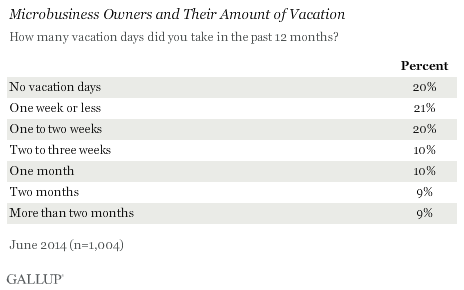
The Sam’s Club/Gallup Microbusiness Tracker follows microbusiness owners’ — those with five or fewer workers, including the owner — basic preparedness and state of mind, highlighting their unique concerns and needs as well as their readiness to meet the day-to-day challenges of being a microbusiness owner. Although virtually all businesses begin as microbusinesses, only some grow into the small, medium, or large enterprises that employ most American workers. Understanding microbusinesses’ unique challenges and concerns can provide important insights into the factors shaping the future of the American economy.
The median annual vacation for microbusiness owners is 12 days, comparable with average vacations across the general workforce. By contrast, the average number of annual vacation days for microbusiness owners in the U.S. is 29 days. That average is pulled higher by the 18% who report taking two months or more of vacation time in the past 12 months.
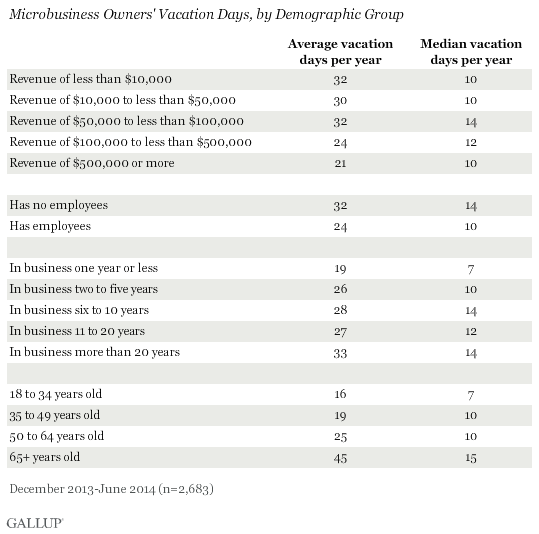
Microbusiness owners reporting higher revenue and those who employ other workers take fewer vacation days, on average, than owners with lower revenue and those who have no employees. Also, those who started their businesses within the past year report taking much less vacation in that time than those running more established businesses. Business owners operating a company for 20 years or more take the most vacation time.
While microbusiness owners bringing in lower annual revenue report taking more vacation, on average, the median amount of vacation increases with higher business revenue. This indicates that a number of microbusiness owners earning lower revenue are vacation “outliers” who take much more vacation per year than their peers. However, among those with the highest revenue (over $500,000 per year) the median number of vacation days drops back down to only 10, while the average number also falls to the lowest number among any revenue bracket. Among these highest-earning microbusiness owners, far fewer take large amounts of vacation.
Microbusiness owners who report taking less vacation in the past 12 months also work more hours per week. Those who say they took no vacation in the past year report working an average of 42 hours per week for the past month, three hours more per week than the average microbusiness owner (39 hours). Owners past retirement age (65+) are the most likely to say they work fewer than 10 hours per week (20%, vs. 15% overall) and to say they take more than two months of vacation (15%, vs. 8% overall).
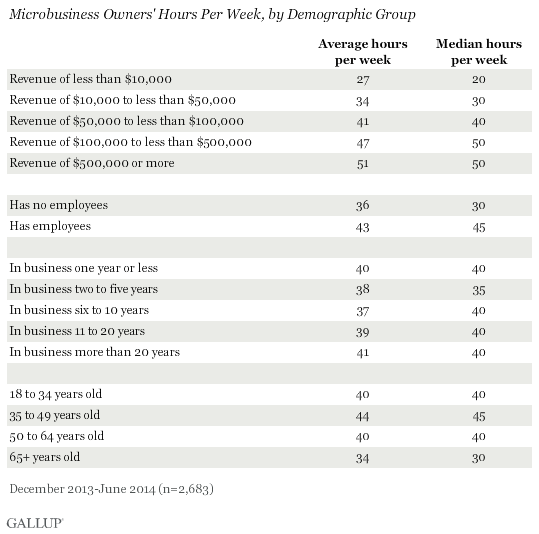
Lack of Vacation Leaves U.S. Microbusiness Owners Less Satisfied but Still Energized
Microbusiness owners who do not take any vacation days are less satisfied with their standard of living and struggle more to balance their work and personal life.
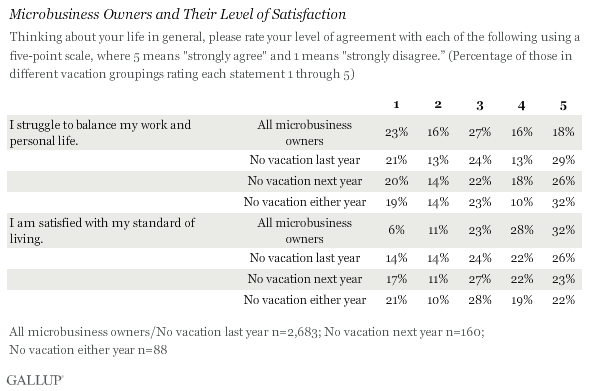
However, compared with all microbusiness owners, just as many of those who neither took nor expect to take a vacation “strongly agree” that they are in excellent health (36%, vs. 37% overall), even while more of them “strongly disagree” (11%, vs. 4% overall). Similarly, just as many of these owners strongly agree that they have the ideal job (42%, vs. 40% overall) even while more strongly disagree (10%, vs. 4% overall). They are also more likely to strongly agree that they feel energized by their work.
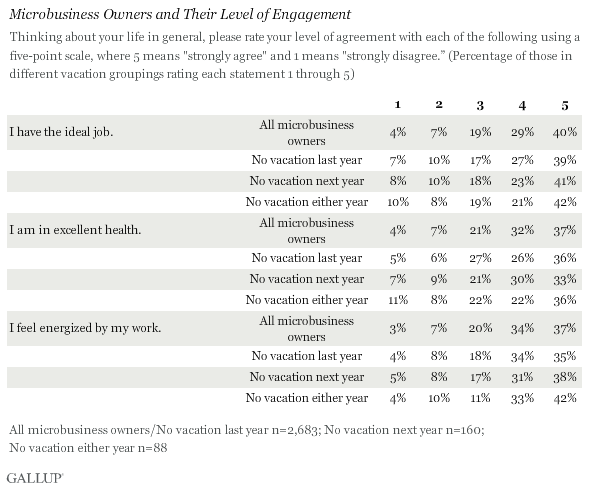
Bottom Line
While microbusiness owners who don’t take vacation time are more likely than their peers who do vacation to report struggling with their work/life balance and being dissatisfied with their standard of living, some appear to be energized by the workload. This polarization may point to two groups of microbusiness owners who take little to no vacation — those who are energized by their ideal job and might choose not to take time away from it, and those who are struggling and might not be able to afford to take time away.
Indeed, microbusiness owners who have just started out and those younger than 35 report taking the fewest median vacation days per year, while median vacation increases with business revenue up to the $100,000- to $500,000-per-year range. These findings suggest that as microbusinesses become more established and bring in more revenue, owners can afford to increase the amount of vacation time they take away from their businesses. Among this group, those who cannot afford (whether in terms of financial ability or available time) to take vacations do not — and those who can, do.
However, among those with the highest revenue (over $500,000 per year) the median number of vacation days drops back down to only 10, while the average number also falls to the lowest number among any revenue bracket. Owners making the most revenue also report working the most hours per week. Despite higher revenues that should enable them to take as much or more vacation than their smaller-budget peers, these microbusiness owners continue to invest more time and energy into their businesses.
Read more Sam’s Club/Gallup Microbusiness Tracker findings at samsclub.com/newsroom (publicly available Monday).
Survey Methods
Results for the Sam’s Club/Gallup Microbusiness Tracker are based on telephone interviews conducted on a quarterly basis with a random sample of microbusiness owners aged 18 and older, living in all 50 U.S. states and the District of Columbia. Business owners selected were those who reported owning a “microbusiness” with five or fewer workers, including the owner. Results from the Quarter 2, 2014, study are based on 1,004 interviews conducted May 8-23, 2014. Results from the Quarter 1, 2014, study are based on 868 interviews conducted Feb. 18-March 2, 2014, and results from the Quarter 4, 2013, study are based on 864 interviews conducted Dec. 2-11, 2013.
Interviews were conducted with respondents on landline and cellular telephones. All interviews were conducted in English. Respondents were chosen at random from a group of people who had completed a previous general Gallup telephone interview and indicated they were a business owner and were willing to be contacted for a future survey. The sample was stratified by business size and weighted for business size and region. For results based on the total sample of Quarter 2, 2014, business owners, the margin of sampling error is ±4.2 percentage points at the 95% confidence interval.
The sample was stratified by business size to be representative of microbusiness owners. Business size distribution was determined by the Gallup Daily tracking survey, which has tracked the number of business owners and size of businesses since March 2013. According to Gallup, 81% of all business owners have fewer than five employees, and 44% do not employ anyone other than themselves. This is a somewhat different picture than that reported by 2011 Census estimates, which puts the number of microbusinesses closer to 92% — 89% of which are non-employer businesses. Many of these non-employer businesses captured by the U.S. Census may be “hobbyist” businesses or businesses that exist on paper but have no real business activity, which were not of interest in the present survey. Thus, the Gallup figures for business size were used for stratification.
For more details on Gallup’s polling methodology, visit www.gallup.com.
